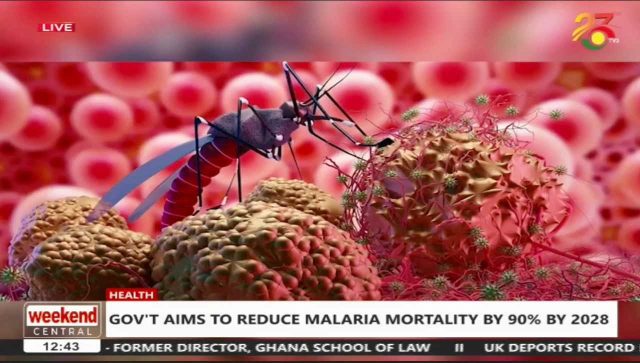Ghana is aiming to reduce malaria mortality by 90% by 2028 and eliminating malaria in 21 districts with very low malaria burden by the same year.
This is against the backdrop of the World Health Organization global technical strategy for malaria 2016-2030, which seeks to achieve a global reduction of at least 90% in malaria mortality rates by 2030.
Ghana remains a high-burden malaria country, with the disease being the leading cause of morbidity and mortality in the country, particularly among children under the age of five years and pregnant women.
In fact, malaria accounts for approximately 20% of all outpatient visits and 22% of all hospital admissions in Ghana (NMEP, 2022).
In 2022, Ghana recorded over 5.2 million confirmed cases and 151 malaria-related deaths which shows a decline in national prevalence from 14.1% in 2019 to 8.6% in 2022, with the Greater Accra region having the lowest prevalence of 2.0%, and the Oti region the highest at 15.0%.
The National Malaria Elimination Program (NMEP) of Ghana is making strides to achieve the malaria elimination agenda of the government of Ghana.

“We’ve been able to reduce our malaria parasite prevalence in children under 5. Our goal is to make sure that we move towards elimination, that is why we have set ourselves for the sub national elimination approach where we know that we cannot eliminate malaria by 2028 in the whole country, but we have zoned the country out. The rest of Greater Accra Region are low, and we are hoping that even as we work with the rest of the 21 districts, because the rest are so close, they will also learn from it and gradually, the Greater Accra Region will be a place where malaria is eliminated.” Dr Keziah Malm, the manager for the NMEP explained.

Speaking to Dr Franklin Asiedu-Bekoe, Director of Public Health Division, Ghana Health Service, he said effectively tackling malaria will be beneficial to the country.

“In terms of profit, malaria alone leads to a loss about 6% of our GDP which is huge. I think that if we are able to address a bit of malaria then clearly you are going to make a lot of profit. It has direct and indirect effects on workers and the organization with respect to the dependence, the employee’s absenteeism, so we think that if we minimize the effect of malaria, there is a lot to gain as a country.” Dr Franklin Asiedu-Bekoe stated.

The Manager of National Malaria Elimination Programme Dr Keziah Malm elaborated on the importance of private sector involvement and support from other stakeholders in the fight against malaria.
“We know that from the strategies we’ve put in place that we can’t do it alone as a public sector institution in the Ministry of Health, so today’s meeting was to bring the private sector on board to bring them to understand why we set out to set those goals and what they are possibly do in the fight against malaria,” she said.

Malaria remains a high priority disease that demands ongoing collaboration among international, national and inter-agency stakeholders at all levels for effective planning, and implementation aimed at its elimination.















